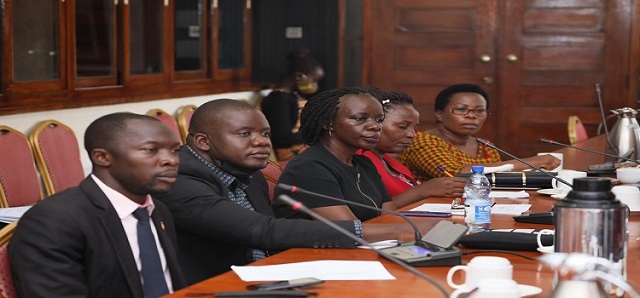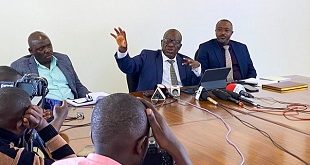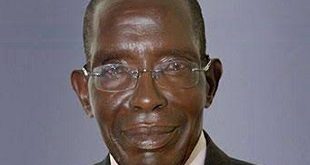
Kampala, Uganda | THE INDEPENDENT | Members of Parliament on the Health Committee have made a case for the need to allow vaccination of children in schools, where parental consent is unavailable.
In a discussion with private school proprietors on Tuesday, 15 March 2022, MPs noted that it is inconsiderate to let some students who are not vaccinated share classrooms with those who are vaccinated.
Rukungiri Municipality Member of Parliament, Dr Elisa Rutahigwa said that some stakeholders presenting views on the Public Health (Amendment) Bill, 2021, have related it to Covid management, yet it is an all-encompassing law.
Rutahigwa said disease outbreaks are often unexpected and can easily attack schools where timely treatment would be key in protecting students from the disease.
“If you left it to parents to take children for immunization or not and you have an infection in your school and have children who are not immunized, would you be comfortable to have them mix with the rest? Don’t you think it is a risk?” asked Rutahigwa.
Ruth Lematia, representative of Maracha East County said Uganda has been doing well as far as vaccination is concerned and adequate information has been given out on the different exercises over the years.
“In the 1980s, children would sing on radio and television to inform parents about the need to be vaccinated. Since we started vaccination, we have been doing well in controlling children mortality,” said Lematia.
Eric Senyonjo, the proprietor of St Anne’s Preparatory School in Kabowa said mandatory vaccination should not be permitted.
He suggested that it should be based on informed voluntary consent, especially for new vaccinations, of which some are still in trial phase.
“Parents of our children know their medical history so they need to be consulted and educated prior to these vaccinations. Therefore, schools should not be held responsible for the decisions of others,” said Senyonjo.
Clause 38 of the Bill seeks to amend section 38 of the principal act by mandating a parent or guardian of every child resident in Uganda to cause the child to be vaccinated by a public vaccinator, against the diseases, that may be declared by the minister, within 12 months from birth.
Senyonjo also said that the Bill should recognise individuals or children who have recovered from a disease and acquired natural immunity, as vaccinated and given a certificate.
Carol Ssekandi from St Anne’s Preparatory School raised concerns about vaccine injury to children in schools, saying the Bill should consider compensation for such incidences.
She cited the case of an MMR vaccine given to children of a one Mulindwa at Green Hill, where the children had already been vaccinated but they received the vaccine a second time without his consent as a parent.
“As parents, we need to be brought on board before anything happens to our children. We should be sensitised on the merits and demerits of these vaccines so that we can protect the generations to come,” said Ssekandi.
Joel Ssebikali, the Deputy Chairperson of the Health Committee said that some children study in schools that are far from reach of their parents, which may make sensitisation for parental consent, difficult.
“A parent is supposed to be responsible for their child’s wellbeing but if there is a mass vaccination exercise at a school, shall you let the child miss out because of parental consent?” Ssebikali asked.
George Bhoka Didi, Obongi County representative emphasised the need to secure the health and well-being of learners given that they spend most of their time at school.
“The stakeholders from the education sector should bring us recommendations that provide a link between the Health Bill and the draft School Health Policy for a healthy school environment beyond vaccinations,” said Bhoka Didi.
Other recommendations by the stakeholders touched on Clause 87 of the Bill that provides for a new clause which provides for punishment without prosecution.
It states that, ‘The minister may in consultation with the ministers responsible for internal affairs, the authority and local governments make rules for offences created by this act or under rules made under this act, for which a person who commits the offence may be given a notice in writing offering that person the opportunity to discharge any liability to conviction for the offence by payment of a fixed penalty’.”
Senyonjo said that this would deliberately infringe on human rights and is an act of dictatorship over the masses, adding that it is constitutional for someone to be heard before penalizing them.
“The alleged perpetrator should be presented before a committee for a fair hearing because he/she could have some wisdom or a science discovery which could help to save the masses,” he said.
*****
SOURCE: UGANDA PARLIAMENT MEDIA
 The Independent Uganda: You get the Truth we Pay the Price
The Independent Uganda: You get the Truth we Pay the Price



Vaccination should be based on informed voluntary consent, especially for new vaccinations, of which some are still in trial phase.
Parents are responsible for their children. They are responsible for their health. In some cases, when a child falls sick and the school doesn’t have the means to treat the child, the parents are called upon.
It is not right to handover power to vaccinate our children to schools and governments.
They already have their hands full. There should be a limit to their control.
There is also no evidence that those children who are vaccinated are healthier than those who are unvaccinated.
The omicron variant is less severe than the first Covid variant. We also cannot say that covid was eradicated bse of vaccines.
All corona virus vaccines have proved to be less effective in adults in terms of all that was said they would do. It has been proved that vaccinated persons can still catch the disease, spread it, and die from it many reported incidences of vaccinated persons hospitalised by the same virus. If all these failures are happening in vaccinated adults, shouldn’t caution be taken as we approach vaccination of children as a matter of common sense? And in the instance that serious adverse events occur in children immunised in schools, its the parents who finally will have to deal with then problems that result. This is why parents must be involved in the consent process when their children are to be vaccinated.